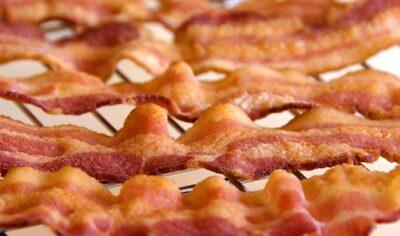
Image source: Agbeat.com
Naturally occurring fats are essential to good health; each cell in our body has a cell membrane made up of a double layer of lipids, and fats are necessary for many metabolic functions.
Vitamins A, D, E and K are fat soluble, and they need fats for storage. Fats are also storehouses of energy, too. Each gram provides nine calories — a ready stock the body can count on at times of severe need.
However, you may be like many other people, still confused about exactly which fats are healthy and which fats are unhealthy. If you are under the impression that saturated fats are bad for you and will cause high cholesterol and heart disease, it’s time you knew the truth about fats!
Fats in nature
Fats occur in both plants and animals. They consist of different types of fatty acids, which are large organic molecules containing many carbon atoms combined with oxygen and hydrogen atoms in different proportions.
1. Saturated Fats
When all the carbon atoms in a fatty acid are tied up with hydrogen atoms, it is called saturated. They remain in solid state at room temperature, and typically have high melting and smoking points. No natural fat or oil is 100 percent saturated, but fats of animal origin, like butter and lard, have high percentage of saturated fatty acids in them compared to vegetable oils. Coconut oil is 92 percent saturated.
2. Monounsaturated Fatty Acids (MUFA)
When carbon atoms in the fatty acid chain are not bonded to hydrogen, they combine with each other by a double bond. Monounsaturated fatty acids have just one such carbon to carbon bonding. They are usually liquids at room temperature but solidify when refrigerated. Olive oil has a very high monounsaturated fat content. MUFAs are found in many nuts like cashews and almonds, too.
3. Polyunsaturated Fatty Acids (PUFA)
Fatty acids with more than one bonding pair of carbon atoms are polyunsaturated. Omega-3 and Omega- 6 fatty acids are the ones we often hear about. Most vegetable oils, including sunflower, safflower, corn, groundnut and canola, have high PUFA content. They typically remain liquid even at low temperatures.
The good fats and bad fats
Take a look at the old cookbooks your grandmothers used. The fats traditionally used for cooking and baking were by and large saturated. Since saturated fats are highly stable, they should be the ideal medium for high-temperature cooking. Their anti-microbial activity offer protection from diseases, too. Examples are butter, lard, tallow and suet. Coconut oil, which has been the mainstay of many island and coastal populations around the world, has the highest amount of saturated fat and has both nutritional and well as medicinal attributes.
Unsaturated fats are by their very nature unstable; polyunsaturated fats even more so than the monounsaturated ones. Olive oil with high proportion of monounsaturated oleic acid may be safely used for light cooking or as a topping for already cooked foods.
Saturated fats have earned a bad reputation as being unhealthy for our heart. They are wrongly implicated in the elevation of cholesterol in the blood, the excess of which is thought to cause cardiovascular diseases and stroke.
The American Heart Association says saturated fats should not exceed 7 percent of the recommended daily calorie intake. Instead, they recommend the highly unstable polyunsaturated vegetable oils to provide the daily fat requirement!
Story continues below video
It all started with the lipid hypothesis….
This theory that dramatically changed how people looked at fats in their diet was proposed by Ancel Keys, an American physiologist. He found cardiovascular diseases (CVD) to be more common in well-fed American executives compared to less affluent Europeans of the post-war period. He concluded that high levels of serum cholesterol caused CVD, and put the blame on saturated fats in the diet. Foods that are high in cholesterol are also high in saturated fats because both come from animals. That led to both of them being clubbed together as harmful.
The truth about cholesterol
Cholesterol is a body fat with a waxy nature. It is necessary for the proper functioning of the lungs and production of hormones. It gives structural stability to cells and tissues; it also prevents, as well as repairs, damage to the artery walls. The very fact that breast milk is very high in cholesterol underlines its importance. Foods of animal origin naturally contain cholesterol. But the truth is that dietary cholesterol is not the same as serum cholesterol, which is synthesized by the body as a protective measure. Otherwise pure vegans would never have cholesterol in their body or blood, which is far from the truth.
People might have associated the solid appearance of saturated fats at room temperature with the artery clogging cholesterol. But room temperature, though arbitrarily fixed at 70 degrees Fahrenheit (20degrees Celcius), varies depending on your location. For example, coconut oil is a clear liquid in the tropics. Our body keeps a healthy 98 degrees Fahrenheit (38degrees Celcius) normally, which is higher than the temperature in most tropical countries. In other words, solid fats do not remain that way within our body. Moreover, analysis of the artery blocks has shown that saturated fats contribute only 26 percent, while the main chunk is polyunsaturated fats touted as heart-healthy by the media as well as conventional medical fraternity.
Story continues below video
Again, it is not the serum cholesterol that damages the arteries. When arterial walls develop lesions, more cholesterol gets pumped into the blood to repair the damage. Some say that the damage could be due to inflammation caused by a western diet, infections or vitamin and mineral deficiencies, especially of B6, B12 and magnesium. Cutting down on saturated fats may deprive the body of many essential nutrients as well as protection from invading germs.
Fats to avoid
In spite of the large scale shift from saturated fats to unsaturated fats, we aren’t getting healthier. Obesity, heart disease, diabetes, degenerative diseases like the Alzheimer’s and Parkinson’s, debilitating rheumatoid arthritis and asthma are on the increase. Alienation from time-tested natural diets and increased dependence on processed foods, including artificially made fats, may be to blame.
But there are fats we should avoid:
1. Hydrogenated fats
They are artificially made from liquid vegetable oils. They are chemically processed into a solid form to resemble naturally solid fats like butter and lard. Better storage life is another attractive feature about hydrogenated fat products like margarine. Food processing industries liberally use hydrogenated fats because they help the crackers and cookies retain their crispiness and prevent them from going rancid even after prolonged storage. The production of trans fats and certain carcinogenic compounds produced during the hydrogenation process make them an unhealthy choice.
2. Trans fats
Trans fats are produced when vegetable oils are partially hydrogenated. They are known to have an adverse effect on the blood cholesterol profile. Trans fats elevates the levels of low density (LDL) cholesterol that has a tendency to stick to the artery walls. At the same time, they reduce high density cholesterol (HDL) that prevents such deposits. These two effects combined make trans fats dangerous for our cardiovascular health.
3. Rancid fats
Many oil seeds keep well within their protective skins or hulls. But, once dehulled, they may become rancid rather fast. Every once in a while we come across a rancid peanut, which leaves a bad taste in our mouth. Rancidity results from the oxidation of the oils. Oil seeds and nuts should be skinned or crushed for immediate consumption only. Flax seeds may be a very rich source of omega 3 fatty acid, but if you are buying it in the crushed form, it may become rancid in no time. Heat also causes oxidation. It would do you more harm than good to consume oil seeds or oils once they are oxidized.
4. Fats heated to their smoke-point
All oils start smoking when heated beyond a point. The smoke point of different oils vary, but they all break down to release the glycerol group in their molecule which then gets converted to acrolein, a carcinogen that contributes to the toxicity of tobacco smoke. Any oil heated beyond its smoke point becomes toxic and full of free-radicals produced through oxidation. The smoke point of vegetable oils like canola and sunflower are very low, owing to highly unstable polyunsaturated fatty acids in them. That makes them the worst choice for cooking. Inhalation of vegetable oil smoke during cooking is thought to be the cause of lung cancer among non-smoking Asian women.
Healthy fats to include in your diet
Large populations enjoying excellent health and longevity, in spite of taking saturated fats in significant amounts, include the French, the Pacific Islanders and the Okinawans. Saturated fats like butter, lard, tallow and suet from animals reared on their natural diet are best for cooking. Everyone can also benefit from coconut oil and olive oil. Raw nuts and seeds are good sources of essential fatty acids and should be a part of any healthy diet.
The best way to be sure that you are getting an ample amount of healthy fats in your diet is to eat a varied and whole, minimally processed diet and stay clear of processed and fast foods.
Sign up for Off The Grid News’ weekly email and stay informed about the issues important to you
 Off The Grid News Better Ideas For Off The Grid Living
Off The Grid News Better Ideas For Off The Grid Living




